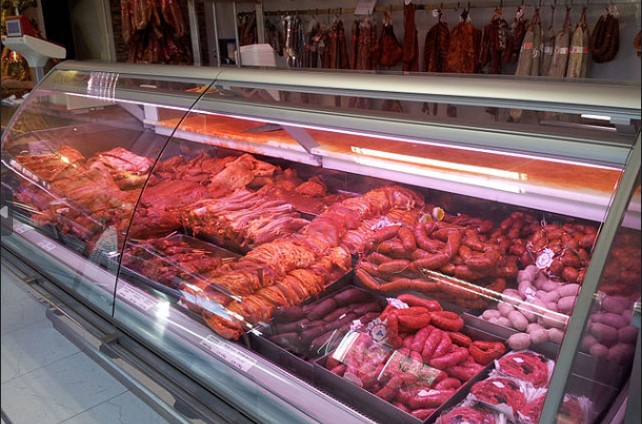

Image of supermarket pork products.
Credit: Xemenendura/Creative Commons Attribution-Share Alike 3.0
In Spain, the surge in prices for items such as pork, fruit juices and olive oil is eclipsing the rise seen in other European Union countries, including economic giants like Germany, France, and Italy.
As of February, the Eurostat food price monitoring tool, developed to facilitate uniform comparisons across EU states, highlighted Spain’s disproportionate price hikes.
For example, olive oil, a staple in many kitchens, saw a staggering 67 per cent price increase in February—the highest jump across the 27 EU countries, surpassing the 51.1 per cent rise in the Eurozone and 50.4 per cent across the EU on average.
Pork and fruit juice price hike
Spain, the world’s third-largest pork producer, is facing more than double the price increase of pork compared to the Eurozone average—11 per cent versus 5 per cent.
Factors such as fuel price hikes and rising energy and feed costs have contributed to this escalation.
Fruit and vegetable juice prices also surged by nearly 19 per cent year-on-year in February, significantly outpacing the 13.3 per cent rise in the euro area and 12.5 per cent across the EU.
Olive oil: A victim of climate
The olive oil industry has been hit hard by a combination of drought and extreme temperatures, leading to a halving of production in the 2022-2023 campaign.
As a consequence it has resulted in a 20 per cent reduction in consumption over the last year and a 35.8 per cent fall in exports, as reported by the Ministry of Industry, Commerce, and Tourism.
Moreover, the price of this ‘green gold’ has skyrocketed by 191.1 per cent since January 2021, based on figures from the National Institute of Statistics (INE).
VAT reductions
The Spanish government’s decision to lower or eliminate VAT on essential goods until the end of June has provided some relief.
This measure, part of an anti-crisis package to combat inflation, has helped temper the price increases of basics like pasta, seed oils, and olive oil itself.
Yet, with food prices continuing to impact consumers, especially those with lower incomes, an extension of VAT reductions beyond June 30 remains a possibility, as hinted by sources within the Ministry of Finance.
In conclusion, Spain’s struggle with escalating food prices amidst a backdrop of climatic challenges and economic pressures exemplifies the broader challenges facing households.
With the government poised to make further decisions on VAT reductions, the hope is that relief is on the horizon for those hardest hit by these increases.
Thank you for taking the time to read this article. Do remember to come back and check The Euro Weekly News website for all your up-to-date local and international news stories and remember, you can also follow us on Facebook and Instagram.